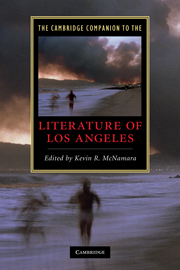Book contents
- Frontmatter
- Introduction: landmarks
- 1 The literature of the Californios
- 2 The Anglo invention of Los Angeles
- 3 LA fiction through mid-century
- 4 British expatriates and German exiles in 1930s-1940s Los Angeles
- 5 Postwar Los Angeles: suburban Eden and the fall into history
- 6 Los Angeles and the African-American literary imagination
- 7 Pacific Rim city: Asian-American and Latino literature
- 8 The literature of urban rebellion
- 9 City of sleuths
- 10 Los Angeles’ science fiction futures
- 11 Hollywood fictions
- 12 The Southland on screen
- 13 Scenes and movements in Southern California poetry
- 14 Surf, sagebrush, and cement rivers: Reimagining nature in Los Angeles
- 15 Essaying Los Angeles
- Guide to further reading
- Index
10 - Los Angeles’ science fiction futures
Published online by Cambridge University Press: 28 May 2010
- Frontmatter
- Introduction: landmarks
- 1 The literature of the Californios
- 2 The Anglo invention of Los Angeles
- 3 LA fiction through mid-century
- 4 British expatriates and German exiles in 1930s-1940s Los Angeles
- 5 Postwar Los Angeles: suburban Eden and the fall into history
- 6 Los Angeles and the African-American literary imagination
- 7 Pacific Rim city: Asian-American and Latino literature
- 8 The literature of urban rebellion
- 9 City of sleuths
- 10 Los Angeles’ science fiction futures
- 11 Hollywood fictions
- 12 The Southland on screen
- 13 Scenes and movements in Southern California poetry
- 14 Surf, sagebrush, and cement rivers: Reimagining nature in Los Angeles
- 15 Essaying Los Angeles
- Guide to further reading
- Index
Summary
Los Angeles is the home of the world's oldest science fiction association, founded in the mid-1930s by Forrest Ackerman. The Los Angeles Science Fantasy Society quickly became an important forum for writers. Ray Bradbury joined the society in 1937 and has repeatedly acknowledged his debt to figures like Leigh Brackett, the filmmaker Ray Harryhausen, Robert Heinlein, and Henry Kuttner, who all offered advice on his fiction. Once established, Bradbury advised younger figures. Although Bradbury has stated that this environment of writers' mutual aid has been lost, the society continues to serve as an important focus for science fiction activities in the city. Los Angeles also has been the site of collaborations like that between Larry Niven and Jerry Pournelle, and individual contacts like Octavia Butler attending Theodore Sturgeon's writing classes at UCLA. Los Angeles has been virtually synonymous with the film business since the 1920s, and LA science fiction novelists like Steve Erickson acknowledge the influence of Hollywood. Aldous Huxley deploys cinematic techniques to explore the future of what he saw as film city in Ape and Essence (1949). Bradbury came to Los Angeles in 1934 and consistently celebrates the creative energy of Hollywood cinema; he received a star on the Walk of Fame in 2002. In his Hollywood novel, A Graveyard for Lunatics (1990), Bradbury describes Los Angeles as a surreal city where anything can happen. The popular culture historian Ron Goulart's satire The Tin Angel (1973) takes a different tack in ridiculing the media publicity machine. Set in 1999, the novel focuses on the animal talent section of Metro-Italian-American Talent, in particular on Bowser, a cocker spaniel who can play the piano and who has been fitted with a voice box.
- Type
- Chapter
- Information
- The Cambridge Companion to the Literature of Los Angeles , pp. 123 - 134Publisher: Cambridge University PressPrint publication year: 2010
- 1
- Cited by

